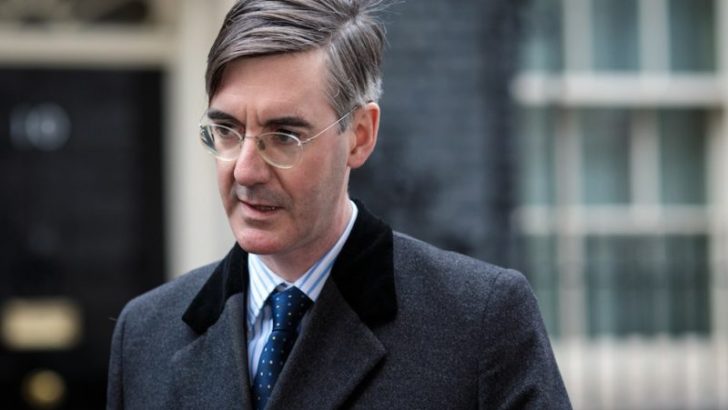The Victorians: The Titans Who Forged Modern Britain
by Jacob Rees-Mogg (W.H. Allen, €20.00)
At the time of writing the futures of Brexit and the British Conservative party are still unsettled. But whatever happens we can expect the author of this book to have some role in it.
Jacob Rees-Mogg is being spoken of by some as a future Chancellor of the Exchequer. This should not surprise us, as he began his pubic life in his teens hectoring chairmen and boards of companies in which he had shares that his dividends were not high enough. He believes in the paramount rights of the investor over any other stake holder in a business, like the mere workers. Little wonder that after university he switched from history to finance.
He is currently a partner in Somerset Investments – famous for setting up a Dublin office to avoid the effects of Brexit — from which he takes his share of £25m year. Many of those who know him in the world of finance speak well of him.
“I think he is perceived,” his business partner says, “ as…a man of huge integrity, huge honesty and a thoroughly decent, fair and courteous person. That’s what people, whoever they are and whatever they think of his views, say.”
Oxford
So personal success on the financial front. But this book is evidence that if Rees-Mogg had a desire to write history he should have continued at Oxford. History is too serious a matter to be a mere hobby. Here in Ireland many were dismayed that he has revealed such ignorance of the past and present of this island – but then Ireland, like Wales and Scotland, is of little interest to the true-born English nationalist.
The critics of his book have not been kind, and sales are reported to have been a poor 700-odd copies in the first week – which might seem like success to a young author whose novel sells a mere 200 or less over all, and finds it hard to get published because the shops are packed with tomes of all kinds by celebrities, like this one.
Jacob Rees-Mogg has been mocked as the “member for the 18th Century”, but as he would be aware he could not, as a Catholic, have been a member of Parliament at all until after 1829.
He has brought his Catholicism into the public arena, which makes it a fair question to ask does a book in which he speaks constantly of the need for “faith” actually reflect Catholic values in any way?
Catholic readers might wish to know what the book has of interest to them. The answer is nothing”
His particular kind of very traditionalist Catholicism has been much admired by some of his co-religionists, who have come to see him a spokesman for their religion too.
Catholic readers might wish to know what the book has of interest to them. The answer is nothing.
However, much that the critics have been saying is true about the people selected. The treatments are often unfocused. One looks to see what Rees-Moggs, in his chapter on Gladstone, might have to say about Gladstone’s notorious pamphlet of 1874, The Vatican Decrees and their Bearing on Civil Allegiance, which enunciates his opinion that the declaring of papal infallibility affected the civil obedience of Catholic subjects in Britain. Faithful to the Pope, they could not be loyal to the Queen Empress.
This has been seen by some historians as the last chance for anti-papal agitation in England. This is only partially true for England, entirely untrue for Scotland and Ireland. The pamphlet drew a famous reply from Newman.
But Rees-Mogg passes over this incident in total silence.
He is not in fact much interested in mere history as history. He sneers constantly at Lytton Strachey’s book Eminent Victorians – he seems to regard the queries that many have about, say, General Gordon’s private life, as beneath contempt.
But Strachey devoted one of his chapters to Cardinal Manning; Rees Mogg has room for Pugin, but not for Cardinal Newman, who will be canonised in October, clearly a Victorian titan.
Rees-Mogg is happy to be…as ‘the best dressed man” in the House of Commons…”
Indeed the moral figures of the age, Dickens, William Booth of the Salvation Army (voted one of ‘100 Greatest Britons’ in a recent poll) , anti-slavery campaigners, women suffragists, engineers, biologists, all those responsible for the really lasting achievements of the era in knowledge of all kinds, are passed over.
His overall attention concentrates on prime ministers and those who are of that political world (even Pugin as the architect of the new Parliament building).
Extraordinary technical and social changes receive little or no discussion. Rees-Mogg sees the era as one of faith; yet it saw the introduction into wide use of the word agnostic. He has so little interest in the varied, controversial and often astonishing religious developments of the period, it makes one wonder about his own concern with religion.
(To seek out the Catholic aspects of this book is quite fair. Was it not Graham Greene who remarked that any British novel with more than 20 characters ought to contain two or three Catholics to be a picture of real life?)
Rees-Mogg is happy to be regarded (according to the Spectator) as “the best dressed man” in the House of Commons. But appearances are not everything.
Matthew Parris, the respected commentator of the Times, thinks Rees-Mogg has “a fine philosophical mind”. If he has, he has chosen not to display it on this occasion.


 Peter Costello
Peter Costello Jacob Rees-Mogg
Jacob Rees-Mogg 